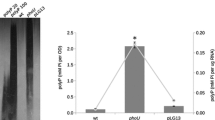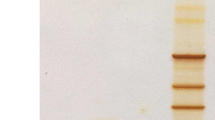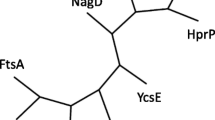Abstract
Polyphosphate kinase (ppk) synthesizes polyphosphate (polyPn+1) from polyPn and ATP and also catalyses its reversal reaction. In the process of identifying stimuli that affect E. coli ppk transcription, we show that purine limitation activates the E. coli ppk promoter by using a single-copy E. coli ppk promoter-lacZ (ppkP Ec -lacZ) fusion and Ez-Tn5 random mutagenesis. The ppkP Ec -lacZ expression was greatly induced (seven to eleven fold higher depending on the media) in purF mutant cells (e.g. cvpA::Ez-Tn5 and ΔpurF mutants). This behavior seems to result from the purine starvation because the ppkP Ec -lacZ expression in the purF mutant cells was recovered to the level of wild-type cells by the addition of any type of purines (adenine, guanine, adenosine, and guanosine). The ppkP Ec -lacZ expression was also increased in other pur mutants but not as much as in the purF mutant cells. Interestingly, the ppkP Ec -lacZ expression was not changed in mutants with defective pyrimidine specific genes (e.g. ΔpyrE and ΔthiC). Transcription of four other bacterial ppk promoters also increased in the purF mutant cells. This data imply that purine deficiency seems to be a common and good inducer in bacterial ppk gene expression. Here, we present a novel report about the effect of purine biosynthesis on ppk gene expression in bacteria.
Similar content being viewed by others
References
Ahn K and Kornberg A (1990) Polyphosphate kinase from Escherichia coli. Purification and demonstration of a phosphoenzyme intermediate. J. Biol. Chem. 265: 11734–11739.
Akiyama M, Crooke E and Kornberg A (1992) The polyphosphate kinase gene of Escherichia coli. Isolation and sequence of the ppk gene and membrane location of the protein. J. Biol. Chem. 267: 22556–22561.
Akiyama M, Crooke E and Kornberg A (1993) An exopolyphosphatase of Escherichia coli. The enzyme and its ppx gene in a polyphosphate operon. J. Biol. Chem. 268: 633–639.
Ault-Riche D, Fraley CD, Tzeng CM and Kornberg A (1998) Novel assay reveals multiple pathways regulating stress-induced accumulations of inorganic polyphosphate in Escherichia coli. J. Bacteriol. 180: 1841–1847.
Ault-Riche D and Kornberg A (1999) Definitive enzymatic assays in polyphosphate analysis. Prog. Mol. Subcell. Biol. 23: 241–252.
Baba T, Ara T, Hasegawa M, Takai Y, Okumura Y, Baba M, Datsenko KA, Tomita M, Wanner BL and Mori H (2006) Construction of Escherichia coli K-12 in-frame, single-gene knockout mutants: the Keio collection. Mol. Syst. Biol. 2: 2006.
Barker MM, Gaal T and Gourse RL (2001a). Mechanism of regulation of transcription initiation by ppGpp. II. Models for positive control based on properties of RNAP mutants and competition for RNAP. J. Mol. Biol. 305: 689–702.
Barker MM, Gaal T, Josaitis CA and Gourse RL (2001b) Mechanism of regulation of transcription initiation by ppGpp. I. Effects of ppGpp on transcription initiation in vivo and in vitro. J. Mol. Biol. 305: 673–688.
Fath MJ, Mahanty HK and Kolter R (1989) Characterization of a purF operon mutation which affects colicin V production. J. Bacteriol. 171: 3158–3161.
Geissdorfer W, Ratajczak A and Hillen W (1998) Transcription of ppk from Acinetobacter sp. strain ADP1, encoding a putative polyphosphate kinase, is induced by phosphate starvation. Appl. Environ. Microbiol. 64: 896–901.
Haldimann A and Wanner BL (2001) Conditional-replication, integration, excision, and retrieval plasmid-host systems for gene structure-function studies in bacteria. J. Bacteriol. 183: 6384–6393.
Harold FM (1966) Inorganic polyphosphates in Biology: structure, metabolism, and function. Bacteriol. Rev. 30: 772–779.
Holmes EW, McDonald JA, McCord JM, Wyngaarden JB and Kelley WN (1973) Human glutamine phosphoribosylpyrophosphate amidotransferase. Kinetic and regulatory properties. J Biol. Chem. 248: 144–150.
Jiang W, Metcalf WW, Lee KS and Wanner BL (1995) Molecular cloning, mapping, and regulation of pho regulon genes for phosphonate breakdown by the phosphonatase pathway of Salmonella typhimurium LT2. J. Bacteriol. 177: 6411–6421.
Kato J, Yamamoto T, Yamada K and Ohtake H (1993) Cloning, sequence and characterization of the polyphosphate kinase-encoding gene (ppk) of Klebsiella aerogenes. Gene. 137: 237–242.
Kim HY, Schlictman D, Shankar S, Xie ZD, Chakrabarty AM and Kornberg A (1998) Alginate, inorganic polyphosphate, GTP and ppGpp synthesis co-regulated in Pseudomonas aeruginosa: implications for stationary phase survival and synthesis of RNA/DNA precursors. Molec. Microbiol. 27: 717–725.
Kim KS, Rao NN, Fraley CD and Kornberg A (2002) Inorganic polyphosphate is essential for long-term survival and virulence factors in Shigella and Salmonella spp. Proc. Natl. Acad. Sci. USA. 99: 7675–7680.
Kitagawa M, Ara T, Arifuzzaman M, Ioka-Nakamichi T, Inamoto E, Toyonaga H and Mori H (2005) Complete set of ORF clones of Escherichia coli ASKA library (A Complete Set of E. coli K-12 ORF Archive): Unique Resources for Biological Research. DNA Res. 12(5): 291–299
Kulaev IS, Vagapov V and Kulakovskaya T (2004) Biochemistry of Inorganic Polyphosphates. Wiley 7 Sons). Mantsala, P. and Zalkin, H. 1984. Glutamine nucleotide sequence of Saccharomyces cerevisiae ADE4 encoding phosphoribosylpyrophosphate amidotransferase. J. Biol. Chem. 259: 8478–8484.
Messenger LJ and Zalkin H (1979) Glutamine phosphoribosylpyrophosphate amidotransferase from Escherichia coli. Purification and properties. J. Biol. Chem. 254: 3382–3392.
Pedersen FS and Kjeldgaard NO (1977) Analysis of the relA gene product of Escherichia coli. Eur. J. Biochem. 76: 91–97.
Rao NN, Gomez-Garcia MR and Kornberg A (2009) Inorganic polyphosphate: essential for growth and survival. Annu. Rev. Biochem. 78: 605–647.
Rao NN and Kornberg A (1999) Inorganic polyphosphate regulates responses of Escherichia coli to nutritional stringencies, environmental stresses and survival in the stationary phase. Prog. Mol. Subcell. Biol. 23: 183–195.
Rashid MH, Rao NN and Kornberg A (2000a) Inorganic polyphosphate is required for motility of bacterial pathogens. J. Bacteriol. 182: 225–227.
Rashid MH, Rumbaugh K, Passador L, Davies DG, Hamood AN, Iglewski BH and Kornberg A (2000b) Polyphosphate kinase is essential for biofilm development, quorum sensing, and virulence of Pseudomonas aeruginosa. Proc. Natl. Acad. Sci. USA. 97: 9636–9641.
Schneider DA and Gourse RL (2003) Changes in the Concentrations of Guanosine 5′-Diphosphate 3′-Diphosphate and the Initiating Nucleoside Triphosphate Account for Inhibition of rRNA Transcription in Fructose-1,6-Diphosphate Aldolase (fda) Mutants. J. Bacteriol. 185: 6192–6194.
Wanner BL (1983) Overlapping and separate controls on the phosphate regulon in Escherichia coli K-12. J. Mol. Biol. 166: 283–308.
Wanner BL (1994) Gene expression in bacteria using TnphoA and TnphoA’ elements to make and switch phoA gene, lacZ (op), and lacZ (pr) fusions. In Methods in Molecular Genetics, vol. 3, K.W. Adolph, ed. (Orlando: Academic Press), pp. 291–310.
Zhou L, Kim SK, Avramova L, Datsenko KA and Wanner BL (2003) Use of Conditional-replication, integration, and modular CRIM plasmids to make single-copy lacZ fusions. In Methods and Tools in Biosciences and Medicine. Prokaryotic Genomics, M. Blot, ed. (Basel, Switzerland: Birkhser Verlag), pp. 65–89.
Author information
Authors and Affiliations
Corresponding author
Electronic supplementary material
Rights and permissions
About this article
Cite this article
Jung, S., Lee, MS., Kim, SK. et al. Effect of purine limitation caused by an amidophosphoribosyl transferase (purF) mutation on polyphosphate kinase 1 (ppk1) gene expression. Genes Genom 34, 27–34 (2012). https://doi.org/10.1007/s13258-011-0128-8
Received:
Accepted:
Published:
Issue Date:
DOI: https://doi.org/10.1007/s13258-011-0128-8




